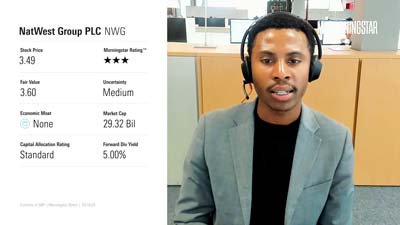Christopher Johnson: Welcome to Morningstar. My name is Christopher Johnson, and today, I'm joined by Sebastiano Pirro, the CIO and Head of Financial Credit Strategies at Algebris Investments and manager of the Algebris Financial Credit Fund.
Sebastiano, thank you so much for being here with me. Your fund's AUM totals at a whopping £10 billion, but some argue that funds can get too big. Can a fund as big as yours be a victim of its own success?
Sebastiano Pirro: Size can bring benefits in terms of running a fund and obviously can bring also hurdles. So, in general, I would say that our best performance has come versus our peers when the fund had a similar size to the one that we have today. Clearly, we have to adapt in running it and this is ongoing, it happens all the time. You need to keep it in mind when you run such a large fund you have to take decisions as early as you can. But then there are also the benefits of running a large strategy. So, if you are well-positioned in certain markets, you can be a price maker and you can basically recover the money that maybe you left because of running it in a certain amount of way at other times. So, I'd say on balance the two things pretty much wash out.
In practice, the fact that the fund is larger means that you have to run it slightly more conservative than if you were smaller. In practice, I would say for us and how we see it going forward is right now given the strength fundamentally of what we invest in and the idea of our fund being a long-only one is basically we don't really see detriments in being large and actually we see the ability of being price makers, especially in primary markets, as benefiting our investors given the size.
CJ: You just talked about the fundamental strengths of what you're investing in. So, what are your expectations for the European banking sector in 2024?
SP: The expectations are that we have – if you look at the fundamental picture today of European banks, it's the best environment we have ever invested in pretty much. We have record amounts of capital that we inherited since pre-pandemic. We have the highest profits of the last 15 years and of course, we have an idea that these profits between the restricted monetary policies which can induce higher loan losses and the reversal of this tight monetary policy with rate cuts being a headwind to profits going forward. That has to be compared with the situation that we were investing in three years ago which were negative rates. So, we still think that the environment remains a very good one even looking forward. Even if profits have peaked, they have not peaked everywhere. But even if they were to plateau where we are today or even trend slightly lower, we think the fundamental picture would remain undeniably strong for European banks.
CJ: According to Morningstar data the fund returned 0.98% beating the Markit iBoxx EU Corp Subordinated Index, which lost minus 3.17%. So, what drove these numbers over the last three years?
SP: In terms of our strategy, we're just simply buying very good companies that are performing very, very well that benefit from higher rates and we were doing that with higher yields and lower duration. So mechanically, that produces the differential in performance that you highlighted, and we think this is still going to continue to be the case because the yields that we are buying today are actually still higher than most of the corporate indices and the quality of the underlying is generally, not everywhere, but generally better than most parts of the market.
CJ: So, the UK is your top country allocation, but is Brexit still the elephant in the room for the financial services industry?
SP: Brexit is an ongoing process that will take many, many years to play out. And for now, it's not been a positive I think we can draw conclusions so far. Now, first of all, in terms of the allocations of our fund, we mainly invest in global companies. So, our global banks might be incorporated in the UK, and the reason there are many global banks that are incorporated in the UK, the reason for that is because the institutions for the banking world work particularly well in the UK versus the rest of Europe. So historically, you have a lot of companies that have their incorporation in the UK because the institutions work very, very well but not necessarily the underlyings are driven exclusively by the country and in some cases they're actually completely, I wouldn't say irrelevant but not particularly relevant at the group level. So even where we have a high allocation to the UK domestic market in the portfolio, the underlying exposure of the companies that operate in the UK is much, much smaller. So, this is the first point I would like to make.
The second point is that the banking market in the UK remains very, very strong and very stable. So, I am unable you know to say so far what we have top-down what Brexit has produced is probably lower economic growth with higher inflation. Now, this is, I wouldn't say is not a worry, it's something that's at the extreme can create, especially on the growth side, can create problems, although banks operate very, very well with inflation. So ultimately, we don't really see this as having an impact in the portfolio. We are mindful, we know it. And it's probably a big missed opportunity, mainly on the equity side. But for the credit side, what has happened since Brexit is that spreads have widened. And so, we have been able to buy very good companies cheaper. And that basically has not been a detriment to the fund's performance, but quite the opposite.
CJ: Intesa Sanpaolo, Santander and Barclays are the three top holdings of the fund at 8% each. So why are you bullish on these issuers?
SP: The style of the fund is to have a sizable exposure to issuers where we're comfortable and to have none where we are not. I think in banks, the idea for us of allocating capital is, if the companies operate stably and are in good health, then you can model them five years forward and be comfortable. And anything that happens – there are obviously unknowns that you cannot predict at times that do materialize. But generally, these companies are able to cope with any of these, because ultimately, we invest in a sector that is also stress tested for negatives each year by the regulators. And they have to operate with a level of capital that can face this level of stress, which tend to never happen.
So ultimately, yes, we are very comfortable with the names that we have at the top positions, all of them. They all highlight very strong capital. They all highlight very good profitability. On the sizes of the positions from running the fund perspective, sometimes companies are unfairly discounted. Think about Barclays from a fixed income perspective a year ago was heavily discounted. And my highlight was, the company was still running at above 10% ROE. It was well profitable. I mean, the concerns from that perspective were completely misplaced and the bonds were very, very cheap. So, if risk-reward all of a sudden turns more favourable than in other issuers, we will increase the size of the position. And that is what you see reflected in the fact sheet of the fund.
CJ: UBS Chief Executive, Sergio Ermotti, recently criticized European politicians and regulators arguing they are suppressing the continent's banks, whilst US rivals dominate globally. Do you agree with this view?
SP: To some extent, yes, meaning that in Europe, the rules to compete within a single market are not yet mature. Let's call it like that. The final implementation of the Basel III was seen globally and from a Europe versus US perspective, as a way to optimize and to create a level playing field between these companies. And as you have seen, since the framework was finalized on the final Basel implementation over six months ago in the US, there was a very hard push from the industry. And the recent signalling that we have gotten from US authorities is that this package will be heavily watered down. Whereas in Europe, we are implementing it and the final go ahead was actually given last week by the parliament.
So, to some extent, European rule-based framework might be more inclusive and will require in some cases higher capital requirements for certain activities, especially on investment banking, that ultimately push – they don't create a level playing field and it might mean that US competitors have a higher return on equity while doing certain activities, while they become largely unprofitable or not economic for some European issuers.
This is a long-term argument. At this point in time, I think that Europe's biggest problem is not versus US institution, but it's basically to create a competitive market within Europe to finally finish the implementation of these rules and to create a level playing field within Europe, because that is a problem. If you have seen recent comments around – today, Europe is much better than it was 10 years ago, but let's say if you operate a bank in Germany and a bank in Italy, the synergies that you have within these two markets are limited and they're limited by the fact that too many differences remain from this perspective. One that has been heavily scrutinized, for example, is the deposit guarantee mechanism, which today remains largely national. I am quite comfortable, though, that as low as this might be, we are increasing competitiveness and today banks are infinitely more competitive in Europe than they were 10 years ago. So, over time, we shall expect more integration, which is especially important for the banking sector, and to make sure that European companies can operate within Europe in a competitive manner, which today is still tentative, let's say that.
CJ: This is Christopher Johnson from Morningstar UK.






























